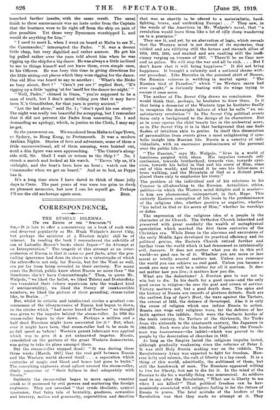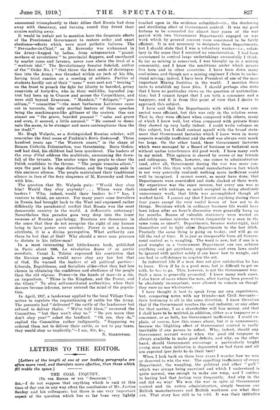CORRESPONDENCE.
Su,—It is late to offer a commentary on a book of such wide and deserved popularity as Mr. Hugh Walpole's Secret City, but perhaps the opinions of a Russian might still be of interest. In reading the book I remembered the sub-title of one of Lafeadio Hearn's hooks about Japan—" An Attempt at an Interpretation." The tragedy of this attempt at an inter- pretation of Russia is that it came ex post facto, after the pre- vailing ignorance had done its share in a catastrophe of which the after-effects not only for Russia, but for the West as well, are yet far from being revealed in their entirety. For many years the British public knew about Russia no more than "the
Rooshians sha'n't have Constantinople." Then, to quote Mr.
Walpole, "we liked the ballet, we liked Tolstoi and Dostoieffsky (we translated their inborn mysticism into the weakest kind of sentimentality), we liked the theory of inexhaustible numbers, we liked the picture of their pounding, steam-roller like, to Berlin. . ."
But, whilst in artistic and intellectual circles a gradual con-
sciousness of the idiosyncrasies of Russia had begun to dawn, in the circles which "had never heard of Teschen " no thought was given to the impulse behind the steam-roller. In 1916 the steam-roller began to slow down. Perhaps a million and a half dead Russians might have accounted for it ? But, what- ever it might have been, that steam-roller had to be made to go full speed as before! Western patent lubricant was applied which was to give it a yet unheard-of impetus. Russia, remodelled on the pattern of the great Western democracies, was going to take its place amongst them.
But the steam-roller stopped dead! "It was during these three weeks [March, 1917] that the real gulf between Russia and the Western world showed itself . . . a separation which centuries of magic and blood and bones had gone to build." The consulting engineers stood aghast around the steam-roller, dimly conscious of "their failure to deal adequately with Russia."
Suddenly the steam-roller began to move again, running
amok as if possessed by evil powers and scattering the foreign engineers. They saw revealed "that crude idealistic, cynical ignorance, that fairy tale of brutality, goodness, cowardice and bravery, malice and generosity, superstition and devotion that was se shortly to be offered to a materialistic, hard- fighting, brave, and unthinking Europe! . . ." They saw, in the words of the American in Mr. Walpole's novel, that "a revolution would leave them like a lot of silly sheep wandering on to a precipice."
They saw it, and yet, by an aberration of logic, which reveals that the Western mind is not devoid of its mysteries, they vilified and are vilifying still the heroes and staunch allies of 1914, 1915, 1916, and exalted and are exalting still the ineffi- ciency verging on treason of 1917. "There'll be no Czar now and no police. We will stop the war and all be rich. . . . But I don't know that it will bring happiness." It did not bring happiness. It brought a calamity and a national shame with- out precedent. Like Hercules in the poisoned shirt of Nessus, the Russian colossus is writhing in mortal agony. "The Russian bird of Paradise," which "no Western snare had ever caught," is furiously heating with its wings trying to escape it once more.
The author of The Secret City draws no conclusions. One would think that, perhaps, he hesitates to draw them. Is it that being a democrat of the Western type he hesitates finally to recognize the downright failure of what he calls "an un- satisfactory revolution "? In The Secret City political events form only a background to the doings of its characters. But
as in some operas the chief beauty lies in the orchestral score, so in The Secret City it is in that background that one finds
flashes of intuition akin to genius. In itself this dissociation of personalities from events gives a most enlightening if sym- bolic insight into Russian life. Russia is a country of indi- vidualists, with an enormous predominance of the personal over the public life :—
" The Russian," says Mr. Walpole, "lives in a world of loneliness peopled with, ideas. His impulses towards self-
confession, towards brotherhood, towards vice, towards cyni- cism, towards his belief in God and his scorn of Him, come out of this world; and beyond it he sees his fellow-men as trees walking, and the Mountain of God as a distant peak, placed there only to emphasize his irony."
The problem of the individual and of his relations to his Creator is all-absorbing to the Russian. Actualities, ethics,
politics—in which the Western mind delights and is master—
to him are phenomenal, unimportant, in fact, Maya. This entirely Eastern conception of life leads to the predominance of the religious idea, whether positive or negative, whether "his belief in God or his scorn of Him," whether he worships or defies.
The expression of the religious idea of a people is the character of its Church. The Orthodox Church inherited and preserved with great assiduity the wealth of metaphysical
speculation which marked the first three centuries of the- Christian era. While Rome in the alarums and excursions of
the early Middle Ages developed its practical efficiency and its political genius, the Eastern Church retired further and further from the world which it had denounced as intrinsically evil, Sansara. Jt does not matter what you do in this evil world—no good can be of it. Whether you are more or less moral or totally amoral matters not. Unless you renounce the world you can achieve no real good. Unless you become a monk you may as well be a robber for all it matters. It does not matter how you live; it matters how you die.
What are the deductions? A Russian goes to war not to win but to die. In his death for a good cause—and the only good cause is religion—he sees the goal and crown of service.
Victory matters not, but a good death does. The epics and the history of Russia are records of glorious defeats. Such are the earliest Lay of Igor's Host, the wars against the Tartars, the retreat of 1812, the defence of Sevastopol. Also it is only the cause of religion which can induce Russia to action.
Russia can wage only religious wars, for the defence of her faith against the infidels. Such were the barbaric hordes of the tenth century, the Tartars of the thirteenth, the Turks from the sixteenth to the nineteenth century, the Japanese in 1904-1905. Such were also the hordes of Napoleon; the French-
man was bassourman—the infidel—which was proved to the people by the desecration of churches in 1812.
As long as the Empire lasted the religious baptise lasted, although gradually weakening since the reforms of Peter I. It was still Holy Russia making war on the infidels. The Revolutionary Army was expected to fight for freedom. How- ever lofty and solemn, the cult of liberty is a lay creed. It is a thing of this world, admittedly, the sublimest of them, but still the handiwork of man. The Russians appeared willing to live for liberty, but not to die for it. In the mind of the Russian to die for a worldly thing was nonsensical. As soldiers used to say after the Revolution, "What use is liberty to me when I am killed?" That political freedom can be har- moniously associated with religious feeling is for the future of Russia to prove. The fatal mistake of the leaders of the Revolution was that they made no attempt at it. They
announced triumphantly to their Allies that Russia had done away with theocracy, and turning round they found their armies melting away.
It would be unfair not to mention here the desperate efforts of the Provisional Government to restore order and exact obedience—efforts which were most pathetic failures. The "Persuader-in-Chief," as M. Kerensky was nicknamed in the Army—hugged by ladies, from octogenarian " grand- mothers of revolutions" to provincial flappers, and smothered by scarlet roses and favours, never rose above the level of a " inatin4e idol." The Revolutionary Senator Sokoloff, author of the "Order No. 1" that threw the first seeds of disintegra- tion into the Army, was thrashed within an inch of his life, having tried mission on a meeting of soldiers. Parties of students hardly out of their " teens " were sent out "touring" on the front to preach the fight for liberty to bearded, grimy reservists of forty-five, who in their wolf-like, lop-sided jog- trot had been up to Cracow and across the Carpathians, and were still beyond Erzereuni. "Mandate," "delegate," "pre- sidium," "committee "—the most barbarous Latinisms came out in torrents, the only martial feature of those speeches being the machinegum-like glibness of the orators. One can almost see "the grave, bearded peasant" "calm and grave and even, it seemed, a little amused." "He seemed to domi- nate the scene, to be stronger and more contemptuous than the ice itself."
Mr. Hugh Walpole, as a distinguished Russian scholar, will remember the final scene of Pashkin's Boris Godounoff. Three hundred years ago "the Western snare," in the shape of Roman Catholic.Polonization, was threatening. Boris Goclou- noff had died, his children had been murdered. The leaders of the coup d'etat address the multitude, announcing the down- fall of the tyrants. The orator urges the people to cheer the Polish candidate to the throne. "The people remains silent," says the poet in his stage directions, and the tragedy ends in this ominous silence. The people maintained their traditional silence in face of the fiery eloquence of M. Kerensky and those with him.
The question that Mr. Walpole puts : "Would they obey him? Would they obey anybody? . . . Where were their leaders ? Who, indeed, would their leaders be ? " has, I venture to think, an answer. For many years some travellers in Russia had brought back to the West and expressed rather diffidently the paradoxical verdict that Russia was the most democratic country in the world. A deffiocratic autocracy! Nevertheless this paradox goes very deep into the inner recesses of Russian psychology. Russians are democrats in the sense that they do not recognize the right of any human being to have power over another. Power is not a human attribute, it is a divine prerogative. What authority can there be but that of God? Why should a mere man presume to dictate to his fellow-men?
In a most interesting but little-known book, published in Paris about 1906, La revolution Busse et so port& mondiale, Count L. Tolstoi expressed his conviction that the Russian people would never obey any law but that of God. He warned the leaders of all political parties— Liberals, Republicans, and Socialists alike—that they had less chance in obtaining the confidence and obedience of the people than the old regime. Power—in the hands of man—is a sin, an imposition. "Thins is the Kingdom, and the Power, and the Glory." To obey self-constituted authorities, when their decrees become irksome, never entered the mind of the popula- tion.
In April, 1917, a landowner applied to the local Village Com- mittee to regulate the requisitioning of cattle for the Army. The peasants had "delivered" the cattle of the landowner but refused to deliver theirs. "We've told them," answered the Committee, "but they won't obey us." "Do you mean they don't obey you?" asked the landlord. "Oh yes, they do," replied the Committee rather indignantly. "Supposing we ordered them not to deliver their cattle, or not to pay taxes, they would obey us implicitly."—I am, Sir, &c.,
N. GOLESEWERI.







































 Previous page
Previous page